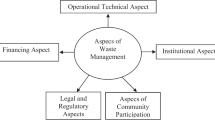Abstract
In China’s rapidly growing cities, urban waste management is becoming one of China’s most pressing concerns. Xin Tong, who has worked on developing new approaches to e-waste management in China, examines the social and economic facets of China’s waste problem, including the consumerist culture and marginalized manufacturing workers that support it. Tong presents a case study of Beijing’s ‘waste villages’, Bajia and Dongxiaokou, which have become urban centres of scavenging and recycling waste, while assessing the community-oriented strategies employed by municipal administrations since the implementation of the ‘urban circular economic system’ in 2000.
Similar content being viewed by others
Acknowledgements
This research was supported by grants from the China National Natural Science Foundation (‘Technological Transition through Extended Producer Responsibility in Electronics Industry’ [41271548]). We thank all of the interviewees for sharing their ideas with us during our field studies. Thanks to all anonymous referees for their advice and suggestions on the early draft.
Author information
Authors and Affiliations
Corresponding author
Editor information
Editors and Affiliations
Rights and permissions
Copyright information
© 2017 The Author(s)
About this chapter
Cite this chapter
Tong, X. (2017). From “Waste Village” to “Urban Circular Economic System”: The Changing Landscape of Waste in Beijing. In: Brevini, B., Murdock, G. (eds) Carbon Capitalism and Communication. Palgrave Studies in Media and Environmental Communication. Palgrave Macmillan, Cham. https://doi.org/10.1007/978-3-319-57876-7_6
Download citation
DOI: https://doi.org/10.1007/978-3-319-57876-7_6
Published:
Publisher Name: Palgrave Macmillan, Cham
Print ISBN: 978-3-319-57875-0
Online ISBN: 978-3-319-57876-7
eBook Packages: Literature, Cultural and Media StudiesLiterature, Cultural and Media Studies (R0)




